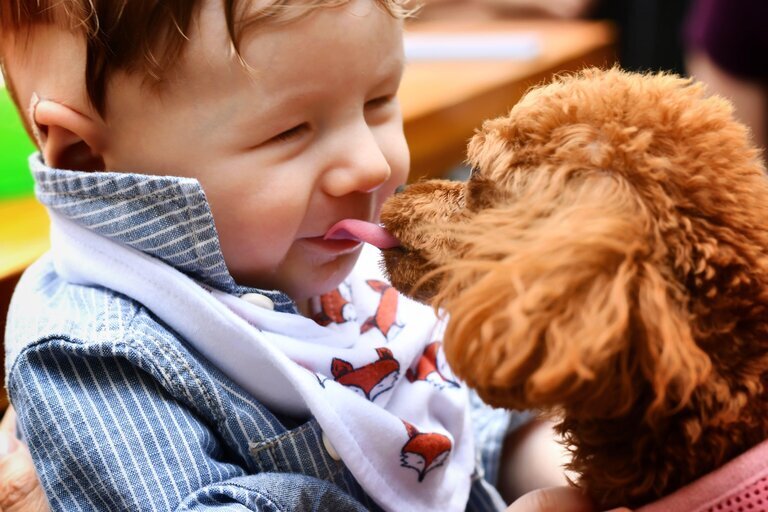
How to stop your dog from excessive licking
Do you have a dog who just can't seem to stop licking? This behaviour could be just a habit, but it could also indicate an issue with your pet's health.
If your pup is constantly licking himself, other pets in the household or surfaces around your home, it’s important that you take steps to try and reduce this behaviour as soon as possible. Fortunately, there are many strategies available for tackling excessive licking in dogs.
From environmental changes to behavioural training techniques. In this blog post we'll discuss why excessive licking can occur and how pet owners, vets (and even doggy daycare workers!) can help prevent it from happening again in the future.
So if you're ready to get started on the journey toward first-class canine etiquette for your favourite four-legged friend – let's dive right in!
Why do dogs lick?
Dogs lick to communicate a variety of emotions, including happiness, submission, stress relief, and affection. They may also use licking as a tool for exploring their environment. Dogs have scent glands in their mouths that allow them to taste and further investigate smells they encounter.
Licking can also help dogs groom themselves or others by distributing natural oils throughout the coat. Additionally, dogs may lick out of habit if it was something reinforced in puppy-hood from the mother or litter-mates.
In these cases, the behaviour is often comforting for the dog even though it can be frustrating for owners dealing with undesired licking behaviours.
How to stop your dogs licking?
Dogs licking themselves and other objects is a common behaviour, but it can be annoying and even dangerous. If you've noticed that your pup has an excessive licking habit, it's important to address the issue so that your pet can stay healthy and happy.
The first step in curbing any unwanted behaviour is to determine why your dog is licking. Oftentimes, boredom or anxiety can cause dogs to engage in this compulsive behaviour.
Make sure that your pup is getting enough exercise and stimulation throughout the day; take them outside for walks, get them toys they can play with, or give them plenty of affection.
If the problem persists, consult with a veterinarian or animal behaviourist to see if there are any underlying medical issues causing your pet’s behaviour.
When your dog begins to lick excessively, it's important to interrupt their behaviour right away. Use a verbal cue such as "No Lick" each time you catch them in the act. This will help reinforce the message that this type of behaviour isn't acceptable. You may need to provide additional distractions such as toys or treats when they start licking again so they won't associate this action with being punished.
In some cases, it may be beneficial to provide physical corrections such as a spray bottle filled with water or citronella spray. Whenever possible, try not to get too angry at your pup for their misbehaviour, instead redirect their attention by offering positive rewards for good behaviours instead!
Licking can also be related to stress or anxiousness in some dogs so make sure you are doing all you can to create a comfortable environment for them at home and on walks." If necessary, talk to a vet about medications that might help reduce stress levels in anxious pets.
Finally, always keep surfaces clean and free of taste stimuli that could encourage licking behaviours; certain perfumes, lotions and cleaning products may be particularly enticing for pets! With consistent effort and patience over time, these techniques should help put an end to any excessive licking habits in no time!
How to stop your dog licking wounds
When it comes to licking wounds, the best way to stop your dog from indulging in this behaviour is to discourage it from the start. Dogs might lick their own wounds due to boredom, anxiety, or even as a coping mechanism for pain. Therefore, it is important that owners are vigilant and carefully observe any signs of licking and act quickly.
One way owners can discourage wound-licking behaviour is by preventing their pet from accessing the area where the wound is located. This can be done by covering the wound with a bandage or some other type of protective material. If possible, it may also be beneficial to distract the dog with food or toys when they begin licking their wounds.
In addition to covering up the wound and distracting your pup away from it, there are a range of products available that can help prevent licking. These include bitter-tasting sprays and ointments that can be applied directly onto the wound, these are designed to make the area taste unpleasant in order to discourage further licking behaviour.
It's also important to take any underlying medical issue into consideration; if your dog's wound-licking behaviour is particularly persistent or frequent then they may have an underlying medical condition such as an allergy or infection which needs treating before you can effectively address the behavioural problem itself.
It's worth consulting your veterinarian in these cases for advice on how best to proceed.
Finally, it may be useful for owners to work with an animal behaviour specialist who can assess their pup’s overall wellbeing and provide guidance on specific training techniques designed specifically for them which promote more desirable behaviours instead – like chewing on appropriate chew toys rather than licking wounds!
Get everything you need to keep your pup happy
We hope this guide has helped you figure out how to introduce dogs into your life. Having a dog join your family is such a fun and rewarding experience.
Scriptly offers just about everything you’ll need to keep your pooch happy and healthy. To shop some of Australia’s most well-known and trusted brands, click here.


